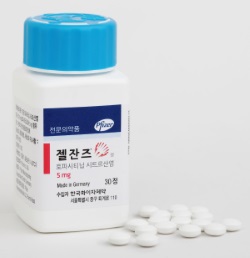Pfizer’s Xeljianz (tofacitinib), an oral Janus kinase (JAK) inhibitor to treat rheumatoid arthritis, won reimbursement for ulcerative colitis as well as of May 1, starting to compete against tumor necrosis factor (TNF) inhibitors.
Pfizer Korea held a news conference on Thursday to celebrate the start of the insurance benefit for Xeljianz to treat moderately to severely active ulcerative colitis in adults. The company shared the current status of ulcerative colitis treatment in Korea and the efficacy of Xeljianz.

Xeljianz is the first JAK inhibitors to obtain approval from the Food and Drug Administration for the treatment of moderately to severely active ulcerative colitis.
It is the only oral JAK inhibitor that can be used for three diseases -- rheumatoid arthritis, ulcerative colitis, and psoriatic arthritis.
Choi Chang-hwan, a professor at the Internal Medicine Department at Chung-Ang University’s School of Medicine, said patients with ulcerative colitis needed a new treatment option because at least 30 percent of patients treated with conventional biologic therapies did not have any response. Besides, conventional therapies had the drug efficacy loss problem by immunogenicity, he said.
Ryu Hyun-jung, medical director for Developed Asia at the Inflammation and Immunology Business Unit of Pfizer, said Xeljianz has quick effectiveness and better user convenience in taking and storing the medicine than biologic agents in ulcerative colitis.
In OCTAVE Induction 1-2 and OCTAVE Sustain studies on patients aged 18 or more with moderate to serious ulcerative colitis with treatment failure, Xeljianz showed fast improvement in reductions from baseline stool frequency subscore and rectal bleeding subscore within three days, compared with placebo.
“Xeljianz can be a new treatment option for patients who fear injections. It is easy to store, compared to existing biologic treatments that require refrigeration. This raises patients’ satisfaction with the treatment,” Ryu said.
After winning insurance coverage in rheumatoid arthritis, Xeljianz sales went up to prove that the demand for an oral drug for the disease was high.
1n July 2017, Korea granted reimbursement for Xeljianz, a status equivalent to biologic therapy in treating rheumatoid arthritis. Xeljianz’ sales in the first half of 2018 reached 3.98 billion won ($3.38 million), more than double the 1.69 billion won sales a year earlier.
However, Xeljianz has weak evidence for long-term safety, compared with TNF inhibitors that have been used for a long time, Choi at Chung-Ang University said.
Rebutting his opinion, Ryu at Pfizer said, “Xeljianz has an eight-year safety profile accumulated as a rheumatoid arthritis treatment, and we have found no issue in the long-term use.”
The American College of Gastroenterology newly included Xeljianz in its 2019 guidelines for the treatment of ulcerative colitis. It strongly recommended as the first-line therapy for patients with moderately to severely active ulcerative colitis who have failed prior therapy with TNF inhibitors.

